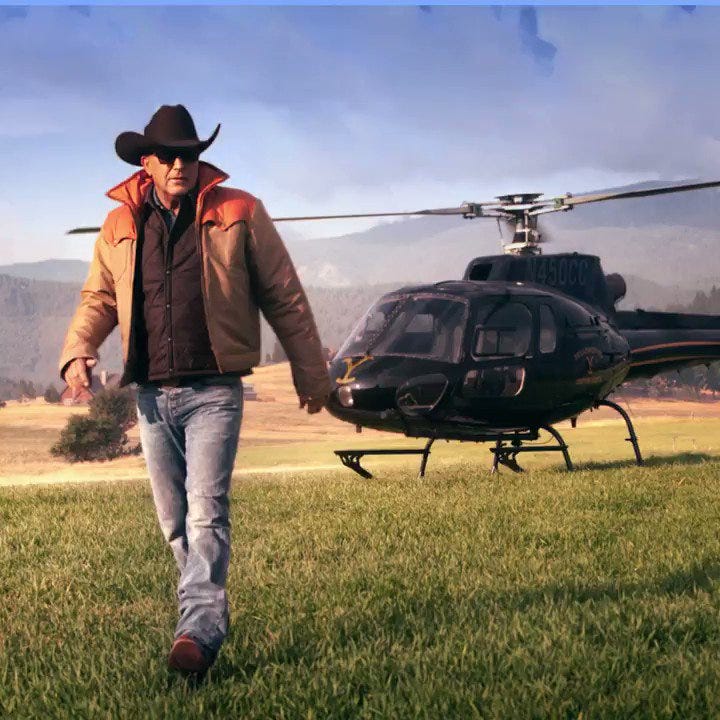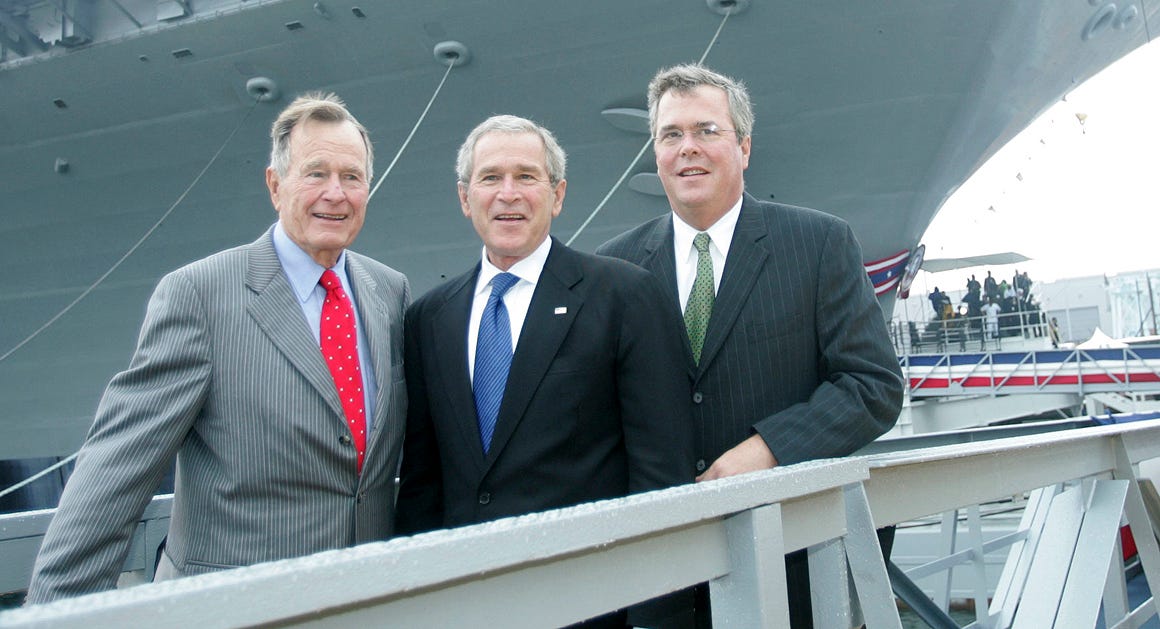This is the conclusion of a 3 part series on Paramount TV’s Yellowstone. Click here for Part I - Land and here for Part II - Race & Class.
This post contains light spoilers.
When referring to the show’s indigenous characters, I use the term “American Indian” in the broad sense and the specific tribal name when available.
You can support JoeWrote by sharing this piece on social media and commenting with your feedback to help me improve.
Season 1, Episode 4: It’s the crack of dawn. John Dutton sips his coffee as dew drips from the rotors of his private helicopter. Jimmy the ranch hand falls hard from his horse. Miles away, a Crow woman shoots herself to escape starvation.
Why are each of Yellowstone’s three groups — owner, worker, original inhabitant — all with ties to the land, experiencing vastly different realities? The answer is simple: Capital.
Capital, the wealth and assets used to make more wealth and assets, is why John Dutton is large-and-in-charge, on his ranch and off it.
Since acquiring the land a century prior (Part 1), the Dutton bloodline has shielded their claim behind America’s racist and classist social system (Part 2), enabling their capital to compound with the snowball effect of inter-generational Capitalism. Ever since their forebearers staked their claim, the Duttons have sold their ranch-raised cattle and reinvested the profits to expand their agriculture empire. With centuries of cow-cash at their disposal, we see the family moving into other businesses, such as real estate, financial investing, horse shows, and even wedding planning. Such is the standard of Capitalism: the never-ending concentration of resources and power in the hands of family dynasties. (Hence why Karl Marx wanted to abolish inheritance.)

At first glance, the pattern of “inherit, invest, inherit, invest” seems a perfectly natural means of economic organization. But whether intended or not, Yellowstone repeatedly shows its audience the flaws of this system. Over the course of four seasons, the show dives into story after story of personal destitution and hardship caused by the Duttons’ hoarding of land and resources. From Monica’s struggle to teach Indigenous children at an underfunded reservation school to the constant injury and exploitation endured by the ranch hands, Yellowstone doesn’t shy away from the catastrophic inequities caused by the society the Duttons benefit from. And it leaves no ambiguity about who to blame.
In the most American scene ever filmed, a Chinese tourist scolds Dutton, telling him: “You have too much land. You should share it with the people.” Gun in hand, Dutton responds: “This is America. We don’t share land here.” He then fires into the air and rides off in a $150k pickup truck, proving all it takes to win a debate in America is a gunshot and a revved engine. 🇺🇸🇺🇸🇺🇸🇺🇸🇺🇸🇺🇸🇺🇸🇺🇸🇺🇸🇺🇸🇺🇸🇺🇸🇺🇸🇺🇸🇺🇸🇺🇸🇺🇸🇺🇸
MAGA Rancher DESTROYS beta commie with FACTS and LOGIC!!!
The message is clear — Yellowstone depicts societal trauma and poverty that could be cured with a better distribution of resources, but that’s off the table, because "We don’t share here.”
Alongside the stories of immiseration, Yellowstone shows how the 21st Century Gentry leverages their wealth to corrupt the law and politics to their favor.
John Dutton starts the show as the Montana Livestock Commissioner (“Cow Police” lol) but is forced to resign after (twice) using police forces as grudge-settling death squads. After he resigns, Beth (Dutton’s daughter) urges her father to run for Governor, saying he can use the office to prevent the Yellowstone from being forfeited due to income taxes.
All the while, this dynastic control over the state’s political system is conducted nonchalantly: the current Governor (who doubles as Dutton’s lover) simply “appoints” him to be her replacement, while Dutton anoints his own son to the very position he is forced to resign from. Elections are an afterthought as the Duttons pick-and-choose which of their family members is best suited to hijack the Montana political system for their personal interests. It’s laughably corrupt, until you realize that’s exactly how the U.S. polity works.
Powerful families like the Duttons only exist to be because of their generational claim to capital. And as we’ve seen from Parts 1 & 2 of this series, they didn’t “earn” that capital because they’re better or smarter than those they lord over, but simply because they’re the descendants of people who were at the right place (Montana) at the right time (1883) and of the right skin color (white).
I’m not convinced Yellowstone’s creator Taylor Sheridan set out to create a drama exposing the inherent flaws of Capitalism, ala Succession. Rather, I believe he combined his personal experience living on a ranch with the history of the American West, and out came a dramatized but realistic depiction of the inequities and tragedies caused by American Capitalism. I hope we get even more Yellowstone so we can keep exploring these stories, one Sunday night at a time.
What are your thoughts on Yellowstone? Let me know in the comments below.
JoeWrote Light Items
Kroger workers are on strike! Sign this petition and pledge not to cross the picket line.
Since you made it this far, you’re probably a fan of TV and Movies, so I suggest you subscribe to Flow With Film for thoughtful reviews and analyses of film/TV.
I’m reading The Bending Cross, a biography of Eugene V. Debbs. TBH I’m pretty pissed I never learned about this important figure in school.




I'm so glad I came across you on Twitter and found these writings.
I can't stop thinking about it.
With the numbers this show is bringing in...whew boy that's a storyline I'd rather people not be super into, withOUT analysis at least as I think there's something to be said to hate watching shows. I liked Succession but also fuck those people... viewer numbers don't differentiate how people feel about the show. Would be curious as to the numbers of people who watch this show and how they feel about the Duttons.